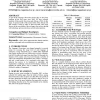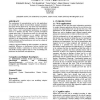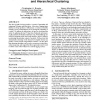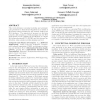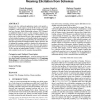WWW
2006
ACM
15 years 6 days ago
2006
ACM
Nowadays a large and growing percentage of information is stored in various multimedia formats. In order for multimedia information to be efficiently utilised by users, it is very...
WWW
2006
ACM
15 years 6 days ago
2006
ACM
We introduce a new, powerful class of text proximity queries: find an instance of a given "answer type" (person, place, distance) near "selector" tokens matchi...
WWW
2006
ACM
15 years 6 days ago
2006
ACM
The evolution of the Web requires to consider an increasing number of context-dependency issues. Therefore, in our research we focus on how to extend a Web application with additi...
WWW
2006
ACM
15 years 6 days ago
2006
ACM
The currently booming search engine industry has determined many online organizations to attempt to artificially increase their ranking in order to attract more visitors to their ...
WWW
2006
ACM
15 years 6 days ago
2006
ACM
The need of formal verification is a problem that involves all the fields in which sensible data are managed. In this context the verification of data streams became a fundamental...
WWW
2006
ACM
15 years 6 days ago
2006
ACM
As part of the Language Observatory Project [4], we have been crawling all the web space since 2004. We have collected terabytes of data mostly from Asian and African ccTLDs. In t...
WWW
2006
ACM
15 years 6 days ago
2006
ACM
The mechanisms for personalisation used in web applications are currently the subject of much debate amongst researchers from many diverse subject areas. One of the most contempor...
WWW
2006
ACM
15 years 6 days ago
2006
ACM
Tags have recently become popular as a means of annotating and organizing Web pages and blog entries. Advocates of tagging argue that the use of tags produces a 'folksonomy&#...
WWW
2006
ACM
15 years 6 days ago
2006
ACM
This work addresses conceptual modeling and automatic code generation for Rich Internet Applications, a variant of Web-based systems bridging the gap between desktop and Web inter...
WWW
2006
ACM
15 years 6 days ago
2006
ACM
In most web sites, web-based applications (such as web portals, emarketplaces, search engines), and in the file systems of personal computers, a wide variety of schemas (such as t...

